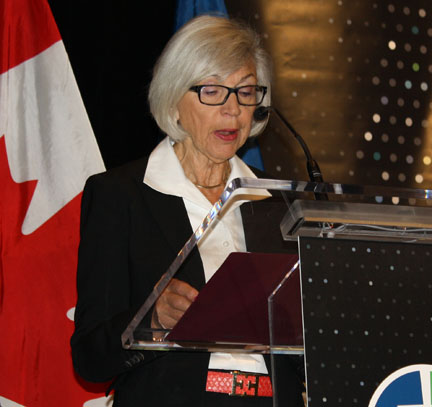
CALGARY — Supreme Court Chief Justice Beverley McLachlin says she has no concerns about newly appointed Justice Russell Brown’s past political writings before his appointment to the bench.
 “I’m not surprised that someone who is engaged . . . will have expressed such views and I have no concerns about that,” said McLachlin, addressing the controversy over Brown’s appointment to the top court last month during a press conference at the Canadian Bar Association council in Calgary this morning.
“I’m not surprised that someone who is engaged . . . will have expressed such views and I have no concerns about that,” said McLachlin, addressing the controversy over Brown’s appointment to the top court last month during a press conference at the Canadian Bar Association council in Calgary this morning.
McLachlin pointed to Brown’s previous role as a legal academic and said it’s common for people to express their opinions before their appointment to the bench.
“He comes to the court with a rich background as a practitioner and law professor,” McLachlin said in her remarks to the CBA council as its annual conference gets underway.
At the press conference, McLachlin also addressed recent commentary that the top court often acts as a type of unofficial opposition to the federal Conservative government.
“I leave the labels to other people,” she said, suggesting the court’s role is to answer the questions put to it in accordance with the law.
“I welcome a robust debate about the role of the court and how we do our job,” she added.
But asked whether she accepts the label as an unofficial opposition, McLachlin was categorical.
“Of course not,” she said. “I’m a not a politician. I’m a judge.”
In her remarks to the council this morning, McLachlin said the top court had had a “productive year.” Citing its busy caseload, she noted some of the key cases it had dealt with, including the Carter v. Canada (Attorney General) matter that dealt with assisted suicide.
She also touted improvements at the Canadian Judicial Council, including providing more detailed information to complaints about the review of the matter; streamlining the conduct review process; and inviting laypeople to participate on review panels that decide whether to refer a complaint to an inquiry committee.
Besides McLachlin’s remarks, the CBA council began considerating a number of resolutions. Several of them dealt with aboriginal matters, including a call to boost the independence of the Specific Claims Tribunal following recent changes by the federal government.
Another key concern arose in a motion dealing with increased difficulty in access to counsel by inmates due to restricted visiting hours, limited phone time, and an inability by lawyers to see clients once they arrive at institutions.
“The conditions really are getting worse and worse,” said Michael Jerch, chairman of the CBA’s national aboriginal law section.
Another issue dealt with lawyers’ concerns about the overuse of and lack of law around solitary confinement in prisons.
“Generally speaking, it’s in a very vague type of realm,” said Bibhas Vaze, a Vancouver lawyer who moved a resolution calling for the CBA to urge governments to pass legislation and policies to restrict and regulate the use of solitary confinement.
The CBA council continues today with additional resolutions around matters such as doctor-assisted suicide and remarks from Janet Fuhrer, the association’s incoming president.